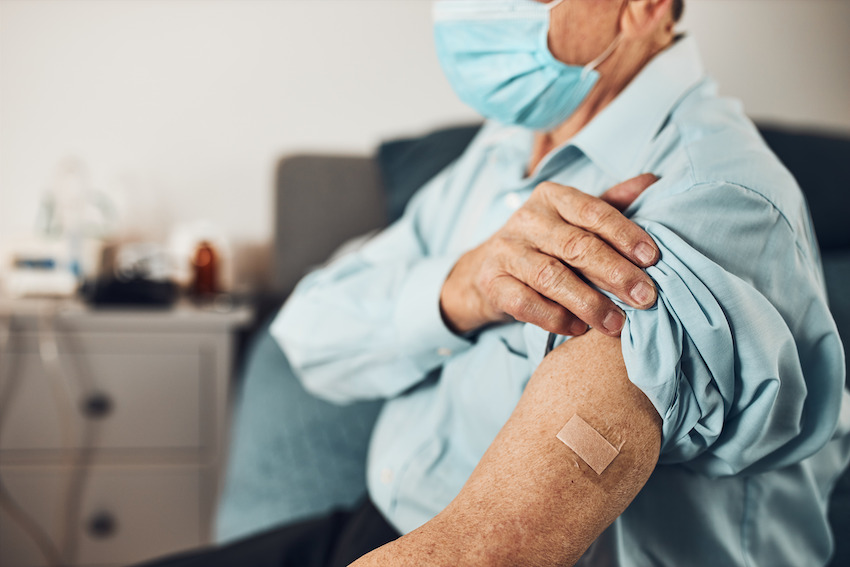Seniors are especially vulnerable to contagious diseases so keeping up with vaccinations is especially important for older adults. Not only are seniors more at risk of becoming infected, from COVID-19 and flu to pneumonia and shingles, they’re also more at risk for becoming more seriously ill, or dying, if they do contract disease.
The recommended vaccines for seniors include:
- COVID-19 vaccine
- Flu vaccine
- Pneumococcal vaccine (for pneumonia prevention)
- Shingles vaccine
- Tetanus-diptheria-pertussis (Tdap) vaccine
While vaccines can’t guarantee that you won’t become infected with disease, they do help minimize the risk of infection. And if you do become infected, they help minimize how ill you might become from infection.
Be sure talk to your primary care provider about which vaccines you or a senior loved one needs.
COVID vaccines and boosters for seniors
Beware of misinformation around COVID vaccination. COVID vaccines for seniors are shown to help reduce the risk of getting COVID or getting seriously ill or dying from COVID. This doesn’t mean that people in the 65 and older age group who get vaccinated for COVID or receive COVID booster shots won’t ever get COVID. There are sometimes “breakthrough” cases, just as with flu and flu vaccinations.
It’s better, however, to have been vaccinated and boosted for COVID. This helps reduce the likelihood of getting sick with coronavirus and of being hospitalized or dying.
If you are immunocompromised, meaning you have underlying medical conditions, such as diabetes, asthma, obesity, or other medical disorders, you are at even greater risk for becoming infected with COVID, and you could become even more gravely ill if you were to become infected.
Do you have COVID-19 symptoms? Be sure to call your primary care provider for guidance. You may need to get tested and your provider may recommend a telehealth or in-office visit. There is also a CDC coronavirus self-checker to assess your symptoms.
If you’re having a medical emergency, call 9-1-1 right away. Find out more about the importance of vaccines.
Flu vaccine for seniors
Other recommended vaccines for seniors include the annual flu vaccine. As you probably know, the influenza virus changes from year to year, as do the vaccines used to treat the virus. Most providers recommend the annual flu vaccine for seniors, starting as early in the flu season as possible (September, for example).
Keep in mind, if you have a heart condition or other chronic disease, you are particularly vulnerable to catching the flu and becoming extremely ill from it. One of the best ways to keep up with flu vaccines for seniors is to schedule your annual well-visit in autumn. That way you can get the flu vaccine in your doctor’s office. If you have a chronic condition, you may also want to discuss chronic care management options.
If you’re not eligible for the flu vaccine due to an egg or latex allergy or other condition, discuss your options with your doctor. Learn more about the importance of flu protection over 65 years old.
Pneumonia vaccine for seniors
Pneumonia is often a complication related to flu and other types of illnesses seniors are susceptible to. The pneumococcal vaccine is a one-time vaccine that helps prevent pneumonia. If you’re older than 65 and had a pneumonia vaccine more than five years ago, an additional pneumonia shot may be recommended.
Shingles vaccine for seniors
Additional recommended vaccines for seniors include the shingles vaccine. Shingles is a painful, contagious rash that causes blisters to form on the body, often on the torso and in the most uncomfortable areas, such as where the waistband of your clothing fits. The shingles or zoster vaccine is generally recommended for any eligible person over 60 years old. It can help reduce the risk of getting shingles by about 50 percent and help reduce how severe the infection in case you happen to get shingles even when vaccinated. The CDC has more information about the importance of the shingles vaccine.
Tetanus-diphtheria-pertussis (Tdap)
Most people under 64 years old, if they have been on a regular vaccine schedule throughout their lives, have received Tdap vaccination. By the time you reach 65, however, it may be time for another round of vaccination. Nowadays, seniors are particularly vulnerable to pertussis, also known as whooping cough, which is making a comeback after having been nearly eradicated for decades.
Need more guidance on recommended vaccines for seniors?
Talk to a primary care provider at Guardian Health. Now accepting new patients and walk-in appointments. Serving the Venice, Florida, and surrounding communities with high-quality, compassionate care for seniors and families. Schedule online today or give us a call at (941) 303-5713.

